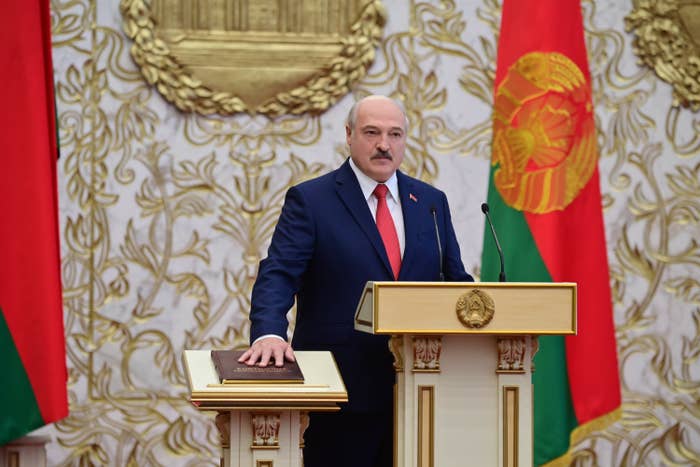
Eight months ago, Secretary of State Mike Pompeo told Belarusian President Alexander Lukashenko in a historic visit to Minsk that their meeting was “a solid first step towards improved relationships and closer ties.”
On Wednesday, the US State Department said it did not consider Lukashenko, the embattled Belarusian strongman who has led the country with an iron fist for 26 years, to be the president of the country any longer.
"The United States cannot consider [Alexander Lukashenko] the legitimately elected leader of Belarus,” a State Department spokesperson said in a statement to BuzzFeed News on Wednesday.
The spokesperson reiterated that the US did not believe that the Aug. 9 presidential elections in Belarus were free or fair. “The announced results were fraudulent and did not convey legitimacy," the spokesperson said.
Lukashenko, an ally of Russian President Vladimir Putin's, claimed he won 80% of the vote and a sixth term despite reports of fraud in his race against Svetlana Tikhanovskaya, a 38-year-old political novice who captured the nation’s attention with her message of change. Pro-democracy demonstrations immediately erupted across the country, with riot police unleashing a brutal crackdown on protesters who claimed Tikhanovskaya had won.
Tikhanovskaya told BuzzFeed News in an interview from Lithuania, where she lives in exile after being forced to flee Belarus, that she is “the national, chosen president.”
Hours before the US announcement Wednesday, Lukashenko had gathered hundreds of government officials and supporters in Minsk for a secret inauguration ceremony that was neither announced beforehand nor televised.
As Lukashenko took part in the clandestine event under heavy security thousands of demonstrators continued their weeks-long protest on the streets of Belarus. They demand that Lukashenko resign and that riot police responsible for the abuse and torture of demonstrators face criminal charges.
The US’s decision to not recognize Lukashenko as Belarus’s president marks a significant collapse in relations between Washington, DC, and the Eastern European leader often referred to as “Europe’s last dictator.”
When Pompeo visited Lukashenko in Minsk in February, he said the two vowed for closer cooperation in the security and economic spheres. The secretary said Belarus had made “real progress” on human rights issues, “but there remains work to do.”
Following the visit, President Donald Trump’s nominated senior US diplomat Julie Fisher to be the next US ambassador to Belarus in April. Minsk expelled the last US ambassador and 30 of 35 diplomats in 2008 after Washington tightened sanctions due to worsening human rights abuses.
Fisher faced a Senate hearing about her nomination in August, but it has been held up since the protests erupted in Belarus.
Stephen Biegun, the US deputy secretary of state, told reporters in a call on Sept. 12 that Fisher “is still in the approval process here inside the United States, and we have not suspended that process.”
